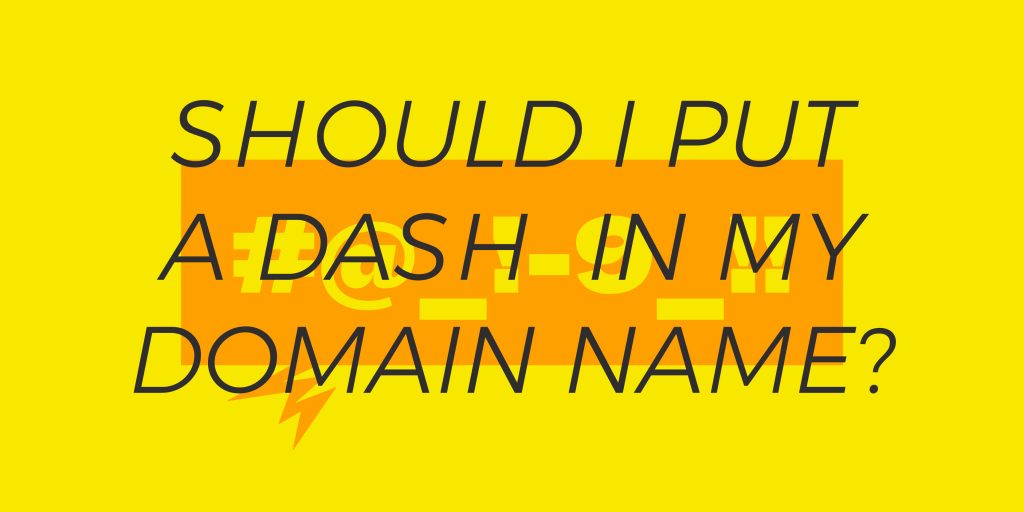In normal, everyday written language, there are a lot of ways to separate words. A space, for one, but also all sorts of punctuation—commas, m-dashes, underscores, asterisks, apostrophes, dots, and more. But in a domain name, you really only have one option: -.
The hyphen, commonly known as a dash (though this is typographically not correct), is the only spacing character allowed in a domain name. That makes it the only option for when you want to register a domain name with two words in it and you don’t want to—or can’t—mash them together with no space between them.
But should you register a domain name with a dash in it?
The case against hyphens
Internet common sense dictates that you should never, ever use a hyphen in a a domain name.
Some of the reasoning behind this is more sound than others. Here’s why people say not to use them:
1. They are hard to communicate
A good rule of thumb for registering domain names is that they should be short, meaningful, memorable, descriptive, and unique.
One way to ensure your domain meets these criteria is to apply something called the “radio test.” Essentially, if your domain name would be easy to say over the radio and be remembered by someone listening, then it passes the radio test and that’s a pretty good sign that it meets these criteria.
Fundamentally, the radio test is a reminder that on the phone, in meetings, doing presentations, at a bar, in an Uber, or in a Zoom call, you’ll be communicating your domain name verbally, so including weird spellings, numerals, and non-verbal symbols like the hyphen, can trip you up when you’re providing your domain name to people, and can make it hard for people to remember.
2. It looks spammy
Domain names that combine multiple words using hyphens have gotten a bit of a bad rap, whether or not they deserve it, as being spammy, and a lot of people will ignore or avoid clicking links that go to these types of domain names for fear of landing on a scam website of some kind.
This can put you on your back foot with your very first interaction with your potential site visitors in terms of trust, and could even come off as unprofessional or tacky in some contexts, though those are aesthetic values of course.
3. SEO?
It’s a common myth, actually, that hyphens in domain names hurts your SEO. While search engines such as Google tend to keep their exact algorithms—their secret sauce—under wraps, it can be surmised based on past statements by Google employees that hyphens in domain names have no impact on their rankings (while this is old information, there hasn’t been any particular trend since this was released to suggest Google would have changed their policy).
Similarly, it’s been suggested that domains that are too long don’t rank as well in search engines. There may be some correlation there, but there’s no indication of a causal link.
The case for hyphens
While the SEO problems that hyphenated domain names supposedly have don’t seem to exist, the difficulty in communicating them verbally and the fact that they can often look spammy are reasons enough to avoid registering a domain with a hyphen in it for your main site.
However, there are some situations in which you might want to register a domain name with a hyphen in it.
1. Legibility
While the “radio test” is a good way to check how well your domain can be communicated verbally, it might be the case that your domain name is likely to be more legible—and therefore easier to understand and remember—with a hyphen than without, such as:
- When registering a domain for a local business
Domain names for local businesses that follow the model of ‘place-product’ or ‘place-industry’ can often benefit from separating the geographic place name (a city for example) from the name of the product or industry, especially because these types of businesses tend to do a lot of advertising in newspapers and billboards. In these cases, separating the geographic area and the product or industry by a hyphen can make the domain name more readable from a distance or at a glance, which will help it be more memorable in the long run. - When registering a domain name in another language
In some languages, adding two words together with no space in between creates a new word with a different meaning than if you had two separate words with a space between. This is the case in German, for example, and is one reason why domains with hyphens in them are much more common than in English. Japanese is another language that this applies to. In these cases, the hyphen makes the domain name easier to understand. - The word is already hyphenated
Likewise, if you’re registering a domain name that uses a word that’s already normally hyphenated, it might be harder for website visitors to remember that your domain _isn’t_ hyphenated. In that case, it makes more sense to keep the hyphen in rather than to artificially remove it in order to satisfy the internet’s “common sense” notion that a domain shouldn’t have a hyphen. - When the divide between two words is ambiguous
There are other possibilities where you might be registering a domain composed of two words where the division between the two words might be ambiguous. A hypothetical person by the name of Samuel Sung may want to register a domain name, but might prefer sam-sung.tld to avoid confusion with the popular electronics brand.
2. Domain availability
Likewise, Mr. Sung may not have the choice to purchase samsung.tld due to the popular electronics brand having already bought that domain, but sam-sung.tld may well still be available.
A word of warning, though—registering a domain name that’s identical to another except with hyphens, maybe not be a wise move in many cases. Even if it’s not your intention, you may seem like you’re trying to squat on a company’s domain name and divert traffic to your own.
If the non-hyphenated version of your domain is already registered, check to see if the non-hyphenated version is being used for an actual website. If not, it’s safer to register your domain.
3. It’s shorter
You might also be able to register a version of your existing domain name that’s shorter by using a hyphen. If you have a domain name that’s composed of two words normally, you could potentially register a domain name like a-b.tld and forward it to your main domain name as a “short” version of your domain name.
Some companies even use these kinds of domains as a kind of custom URL shortener.
4. You already own the other version
Finally, you might want to register a domain name with a hyphen in it because you own the non-hyphenated version. This is especially important if you’re looking to protect your brand name or other intellectual property, or if you just want to avoid confusion.
In that case, we suggest you register the hyphenated version of the domain and forward it to the non-hyphenated version.
Ultimately, in general, we agree with the “common sense” that you shouldn’t register a domain name with a hyphen. This is a good best practice to have.
But it’s important not to treat domain name best practices dogmatically. This is a good example of a “rule” that’s really just a shortcut for the more important, big picture, which is: consider your future website visitors when you register a domain name. If it’s going to be complicated to explain to them and complicated to remember your domain name if you include a hyphen, don’t include it. Otherwise, feel free to register a domain with a hyphen in it. And finally, if you have the budget, getting both the hyphenated and non-hyphenated versions of a domain name is a good idea for brand protection, and for traffic generation.
Now, that you know how to deal with dash in domain names, get your own domain name !
Tagged in Domain name



